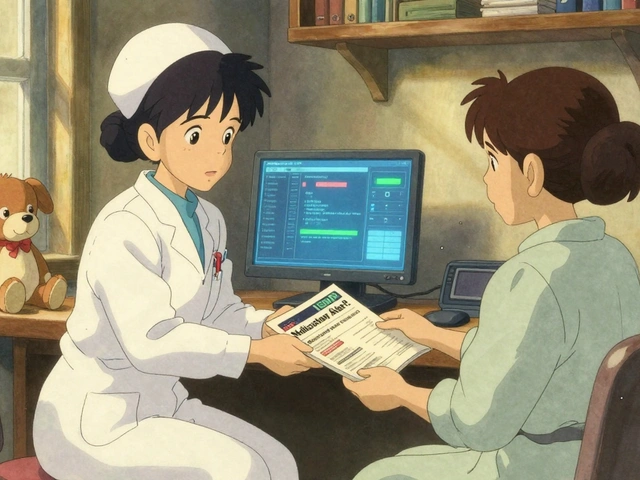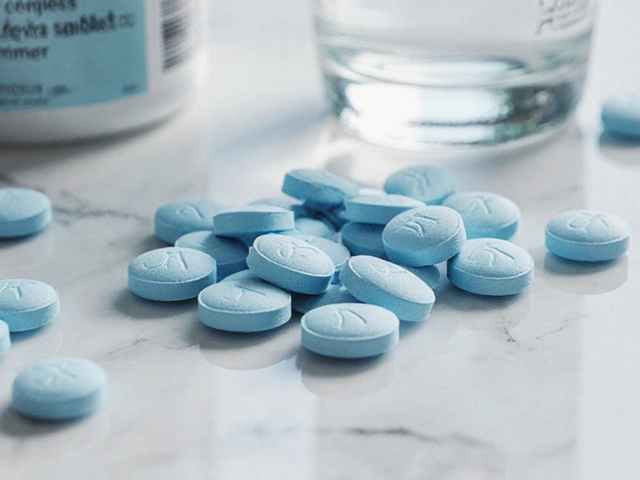
Medication Smell Risk Checker
This tool identifies medications that may cause dysosmia (smell distortion) based on the article's medical research. Note: This is not medical advice. Always consult your healthcare provider.
Risk Assessment
Have you ever taken a pill and suddenly everything smells wrong? Bread tastes like ash. Coffee smells like burning plastic. Or worse-you smell smoke when there’s no fire, or metal when you’re just drinking water? You’re not imagining it. This isn’t normal aging or a lingering cold. It’s dysosmia-a distortion in how your brain interprets smells, often triggered by common medications.
Most people don’t realize how many drugs can mess with your sense of smell and taste. It’s not rare. In fact, over 500 medications are known to cause these changes. And because doctors rarely ask about it, many patients suffer for months-or even years-thinking it’s something else entirely. You might be one of them.
What Exactly Is Dysosmia?
Dysosmia means your nose and brain aren’t talking right. You smell things that aren’t there (phantom smells), or familiar scents turn foul. A banana might smell like rotten eggs. Your own breath could feel like a trash can. This isn’t just annoying-it’s debilitating. People report losing interest in food, dropping weight, avoiding social meals, and even missing gas leaks because they can’t smell them.
It’s not the same as losing smell entirely (that’s anosmia). Dysosmia is a glitch in perception. Your nose still works, but the signal gets scrambled on the way to your brain. Think of it like a corrupted audio file-same song, wrong sound.
Which Medications Cause This?
It’s not just one type of drug. It spans antibiotics, heart meds, antidepressants, and more. But some stand out because they’re so common-and so likely to trigger the problem.
- Antibiotics: Azithromycin, clarithromycin, doxycycline, levofloxacin, and moxifloxacin are top culprits. Fluoroquinolones like levofloxacin can cause a metallic taste within hours of taking them. One woman in a 2021 case study lost 8 pounds in three weeks after starting levofloxacin because food tasted like bile.
- Heart medications: Midodrine, used for low blood pressure, has been linked to persistent smell distortions. The mechanism isn’t fully clear, but it’s different from how antibiotics do it.
- Neurological drugs: Carbamazepine (for seizures) and baclofen (for muscle spasms) can cause severe taste and smell loss. Some patients report complete loss of taste alongside smell distortion.
- Other offenders: Thyroid meds like carbimazole, diabetes drugs like tolbutamide, and even some antidepressants like sertraline have been tied to dysosmia.
It’s not about dosage. Even standard prescriptions can trigger this. And it doesn’t matter if you’ve taken the drug before-this can show up out of nowhere.
How Do These Drugs Break Your Smell?
It’s not magic. It’s chemistry. Medications interfere with the tiny cells in your nose and tongue that detect smells and tastes. These cells have receptors that respond to chemicals in the air and food. Drugs can:
- Block those receptors so they can’t send the right signal
- Keep them stuck in “on” mode, so you smell things that aren’t there
- Disrupt the minerals your cells need to reset-like zinc, calcium, or magnesium
For example, fluoroquinolone antibiotics (like levofloxacin) bind to zinc, which your smell cells need to function. Macrolides like azithromycin lower magnesium levels. Without these minerals, your cells can’t reset after detecting a smell-and that’s when the distortions start.
Some drugs, like lidocaine given through an IV, can cause instant metallic taste. That’s because they directly touch the nerves in your mouth. But oral meds? They work slower. Symptoms often appear 7 to 14 days after starting the drug.

Why Is This So Often Missed?
Because no one asks.
A 2022 survey in JAMA Internal Medicine found only 37% of primary care doctors routinely ask patients about smell or taste changes when reviewing meds. But 78% of ear, nose, and throat specialists do. That gap means most patients are left guessing.
Patients often assume it’s a cold, allergies, or aging. They don’t connect it to their new pill. And when they do mention it, doctors might dismiss it as “just a side effect” without exploring options.
But here’s the thing: this isn’t harmless. Up to 30% of people with medication-induced dysosmia lose significant weight because food becomes unappetizing-or even terrifying. One Reddit user lost 15% of their body weight over four months because everything tasted like rotten eggs after azithromycin.
Does It Go Away?
Maybe. But not always.
According to the landmark 1995 Schiffman and Nagle study, 78% of cases improve within three months after stopping the drug. But 22% don’t. And for some, the distortion lasts for over a year-even after the medication is gone.
Why? Because the damage isn’t always temporary. If the smell cells are destroyed or the signaling pathways are permanently altered, your brain doesn’t just “get used to it.” It keeps misfiring.
There are rare cases where another drug helps. Mirtazapine, an antidepressant, has been shown to reverse taste distortion in a few patients within days. But that’s not a cure-all. Zinc supplements? Some doctors suggest them-but experts like Dr. Thomas Hummel warn they can cause copper deficiency if taken long-term without testing. There’s no universal fix.

What Should You Do If This Happens to You?
Don’t panic. But don’t ignore it either.
- Track your symptoms. When did they start? What smells changed? Did you start a new med around then? Write it down.
- Don’t quit your meds cold. Some drugs (like blood pressure or seizure meds) can be dangerous to stop suddenly. Talk to your doctor first.
- Ask about alternatives. Can you switch to a different antibiotic? Is there another heart med that doesn’t carry this risk? Many options exist.
- Get tested. The University of Pennsylvania Smell Identification Test (UPSIT) is a 40-item sniff test doctors can use to measure your smell function. It’s not perfect, but it’s better than guessing.
- Seek a specialist. If your doctor shrugs, ask for a referral to an otolaryngologist (ENT) who specializes in smell and taste disorders. They’re the only ones who know how to test and treat this properly.
Support groups exist. The nonprofit Fifth Sense runs monthly virtual meetings for people with medication-induced smell loss. Over 150 people attend each session. You’re not alone.
What’s Changing in Medicine?
This isn’t just a personal issue-it’s becoming a medical priority.
The FDA now encourages drug makers to include smell and taste changes in clinical trials. In 2024, the European Medicines Agency will require these assessments for all new antibiotics and heart drugs. AstraZeneca even filed a patent in 2022 for a treatment targeting drug-induced smell loss.
Researchers are testing new drugs that target the TRPM5 channel-a key player in taste and smell signaling. Early trials are underway. In the next five years, we may have treatments that don’t just manage symptoms but fix the root cause.
For now, awareness is the best tool. If you’re on a medication and your world smells wrong, it might not be you. It might be the pill.
Real Stories, Real Impact
One woman in Sydney started doxycycline for a skin infection. Two weeks later, her husband’s cologne smelled like burnt rubber. Her coffee tasted like gasoline. She stopped eating. Lost 12 pounds. Thought she had a brain tumor. She didn’t. It was the antibiotic.
Another man, 68, took midodrine for low blood pressure. Suddenly, he smelled cigarette smoke all day-even though he’d never smoked. He stopped going to the park. Avoided friends. His wife cried because he wouldn’t sit with her at dinner.
They both got better after switching meds. But it took months. And they both wish someone had asked sooner.
Smell isn’t just about enjoying food. It’s about safety, connection, memory, and survival. When it breaks, life changes. And it’s time we started treating it like the serious side effect it is.
14 Comments
Write a comment
More Articles

Medication Safety for College Students and Young Adults: What You Need to Know
Medication safety for college students and young adults means understanding the risks of sharing prescriptions, storing meds properly, and avoiding stimulant misuse. Learn what works, what doesn't, and how to stay safe.



Erika Sta. Maria
November 20, 2025 AT 08:28okay but have yall ever thought that maybe our noses are just *too sensitive*?? like, maybe this isn't a drug problem... maybe it's that our brains are finally catching up to how much chemical garbage we're breathing in daily?? i mean, we're literally swimming in phthalates and parabens, and now we're surprised when our olfactory system rebels?? it's not the pill, it's the world. 🤷♀️